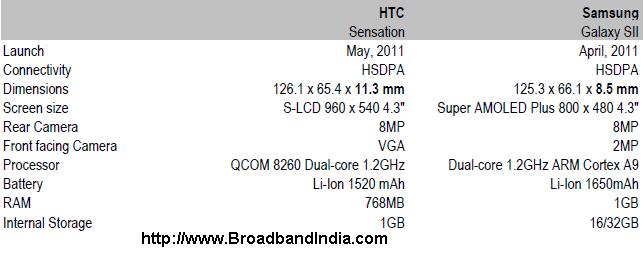Samsung Galaxy S II has come as big challenge for HTC Sensation. We compare both the Phones from an Engineer’s perspective. Both are 3G phones supporting HSPDA network and are built on Android 2.3.
Galaxy S II was able to score better than HTC Sensation on its processor performance while at the same time beat Sensation at battery life, which in our view, was driven by Samsung’s AMOLED panel, which gives Samsung substantial competitive advantage. The following chart shows a Detailed Side by Side comparison of HTC Sensation and Samsung Galaxy S II 
CPU Performance – Samsung Scores Higher
Given Samsung Exynos process is based on ARM’s architecture license on Cortex A9 while QCOM’s MSM8260 is based on standard IP
license from ARM’s CORTEX A8 architecture. Simply put, Samsung’s Exynos is a true dual core processor that used SMP (Symmetric multiprocessing) while QCOM 8260 is based on ASMP (asymmetric multiprocessing).
Additionally, Samsung Exynos is using dual chip architecture (with baseband and standalone application processor) while QCOM is using single chip architecture (baseband and processor integrated into a single chip). Dual chip architecture (discrete solution) has better performance than integrated solution.
Size Variations:
HTC Sensation and Samsung Galaxy S II have almost identical screen size, both ~4.3 inch, so the dimension is quite similar. The key difference is thickness, Samsung is only 8.5mm vs HTC at 11.3mm.
Battery Life – Samsung Galaxy Vs HTC Sensation
The biggest power sucker in Smartphones with touch interface is the Panel 🙂 For high end smartphones with a 4 plus inch screen, screen can account for more than 50% of the power consumption while CPU accounts for less than 25%. The average power
consumption of AMOLED is 30-50% lower than super LCD.
Samsung actually fit a slightly bigger battery in the Galaxy S II, which suggests that the thinner AMOLED screen may allows Samsung
to fit more components in a smaller space. However, AMOLED is the real reason for longer battery life and battery itself.
In 2008, HTC had shipment of 88% of Windows based mobile phones and mere 12% of Android. By Dec-2011, the scenario would have interchanged and Android would make 88% of the sales backed by the HTC Sensation Wave 🙂